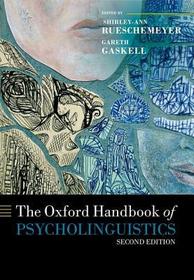
The Oxford Handbook of Psycholinguistics
Sorozatcím: Oxford Library of Psychology;
-
10% KEDVEZMÉNY?
- A kedvezmény csak az 'Értesítés a kedvenc témákról' hírlevelünk címzettjeinek rendeléseire érvényes.
- Kiadói listaár GBP 130.00
-
62 107 Ft (59 150 Ft + 5% áfa)
Az ár azért becsült, mert a rendelés pillanatában nem lehet pontosan tudni, hogy a beérkezéskor milyen lesz a forint árfolyama az adott termék eredeti devizájához képest. Ha a forint romlana, kissé többet, ha javulna, kissé kevesebbet kell majd fizetnie.
- Kedvezmény(ek) 10% (cc. 6 211 Ft off)
- Kedvezményes ár 55 897 Ft (53 235 Ft + 5% áfa)
Iratkozzon fel most és részesüljön kedvezőbb árainkból!
Feliratkozom
62 107 Ft

Beszerezhetőség
Becsült beszerzési idő: A Prosperónál jelenleg nincsen raktáron, de a kiadónál igen. Beszerzés kb. 3-5 hét..
A Prosperónál jelenleg nincsen raktáron.
Why don't you give exact delivery time?
A beszerzés időigényét az eddigi tapasztalatokra alapozva adjuk meg. Azért becsült, mert a terméket külföldről hozzuk be, így a kiadó kiszolgálásának pillanatnyi gyorsaságától is függ. A megadottnál gyorsabb és lassabb szállítás is elképzelhető, de mindent megteszünk, hogy Ön a lehető leghamarabb jusson hozzá a termékhez.
A termék adatai:
- Kiadás sorszáma 2
- Kiadó OUP Oxford
- Megjelenés dátuma 2018. augusztus 30.
- ISBN 9780198786825
- Kötéstípus Keménykötés
- Terjedelem1088 oldal
- Méret 246x171 mm
- Súly 2196 g
- Nyelv angol 40
Kategóriák
Rövid leírás:
With contributions from the fields of psychology, linguistics, cognitive neuroscience, attention, genetics, development, and neuropsychology divided into five themed sections, this new edition of The Oxford Handbook of Psycholinguistics is unparalleled in its breadth of coverage.
TöbbHosszú leírás:
The ability to communicate quickly and flexibly through both spoken and written language is one of the defining characteristics of the human race. Yet it remains a mysterious process. The science of psycholinguistics attempts to uncover the mechanisms and representations underlying human language. This interdisciplinary field has seen massive developments over the last decades, with a broad expansion of the research base, and the incorporation of new experimental techniques such as brain imaging and computational modelling. The result is that real progress is being made in the understanding of the key components of language in the mind.
This new and expanded edition of The Oxford Handbook of Psycholinguistics brings together the views of over 80 experts in various domains of psycholinguistic research, offering a comprehensive and authoritative review of the field. With contributions from the fields of psychology, linguistics, cognitive neuroscience, attention, genetics, development, and neuropsychology divided into five themed sections, this new edition of The Oxford Handbook of Psycholinguistics is unparalleled in its breadth of coverage.
The comprehensive nature of this book coupled with the accessibility of the short chapter format makes this handbook essential reading for students and researchers in the fields of psychology, linguistics and neuroscience.
Review from previous edition ..an authoritative and exhaustive account of the state of the art in psycholinguistics...an indispensible resource for all those interested in language processes. -
Tartalomjegyzék:
Part One: Language Comprehension
Section One: Sublexical and Lexical Level
Segmentation of speech
Spoken word recognition
Visual word recognition
Lexico-semantics
Lexical Ambiguity
Visual word recognition in multilinguals
Varieties of Semantic Deficit: Single Word Comprehension
Section Two: Sentence and Discourse Level
Sentence comprehension
Text Comprehension
Bilingual sentence processing
Sentence level aphasia
Language in Deaf Populations: Signed Language and Orthographic Processing
Part Two: Language Production
Section One: Sublexical Level
Speech Production: Integrating Psycholinguistic, Neuroscience, and Motor Control Perspectives
Links between Perception and Production: Examining the roles of motor and premotor cortices in understanding speech
Section Two: Lexical Level
Spoken word production: Representation, Retrieval and Integration
Connectionist Principles in Theories of Speech Production
From Thought to Action: Producing Written Language
Grammatical Encoding
Section Three: Sentence and Discourse Level
Cross-linguistic/bilingual language production
The relationship between syntactic production and comprehension
Word production and related processes: evidence from aphasia
Attention and Structural Choice in Sentence Production
Part Three: Interaction and Communication
Section One:
Perspective-Taking During Conversation
Alignment during Interaction
Role of Gesture in Language Processing: Towards a Unified Account for Production and Comprehension
Pragmatics and Inference
Experimental Pragmatics
Language Comprehension, Emotion and Sociality: aren't we missing something?
Part Four: Language Development and Evolution
Section One: Ontogenetic Development
Development of Prosodic Phonology
How Well Does Statistical Learning Address The Challenges of Real World Language Learning?
First Word Learning
Language and conceptual development
Artifical Grammar Learning and its Neurobiology in Relation to Language Processing and Development
Developmental Dyslexia
Developmental Language Disorder
Section Two: Phylogenetic Development
Evolution of Speech
The Genetics of Language: from Complex Genes to Complex Communication
Models of Language Evolution
Part Five: Methodological Advances in Psycholinguistic Research
Section One:
Generalizing over encounters: statistical and theoretical considerations
Cognitive Electrophysiology of Language
Source estimation, connectivity and pattern analysis of EEG/MEG data in psycholinguistics
New fMRI methods for the study of language
Intracranial electrophysiology in language research




